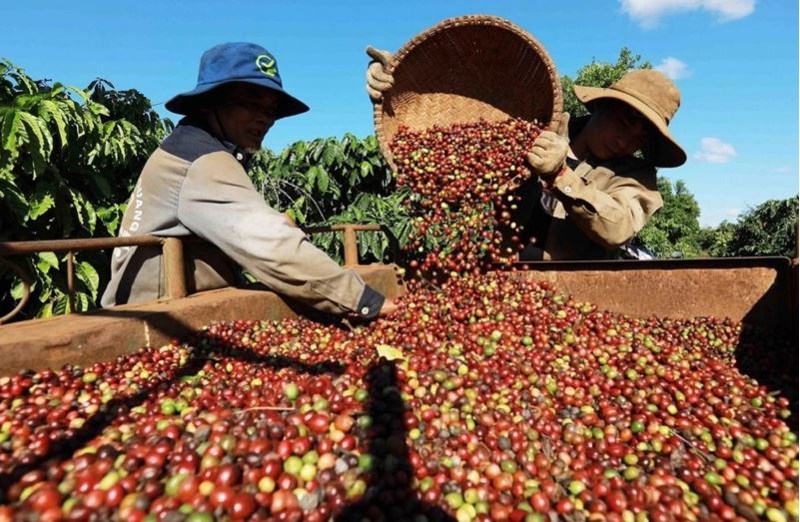Vietnam’s coffee industry is preparing for challenges in the US market as the competition from Brazilian coffee, supported by more favorable tax policies, intensifies. Despite this, industry experts remain optimistic, projecting that Vietnam’s coffee export revenue could reach an all-time high of $7 billion this year.
EU leading the export market
The EU remained Vietnam’s largest coffee export market, accounting for 39 per cent of total export revenue. Germany led within the bloc, representing nearly 17 per cent of both Vietnam’s total coffee export volume and value. In the January - April period, exports to Germany stood at 112,843 tons, worth $628.12 million, with an average price of $5,566.4 per ton, reflecting a 17 per cent increase in volume, a 97.6 per cent spike in value, and a 69 per cent rise in price year-on-year.
Exports to Germany totaled 27,889 tons in April, valued at $153.51 million, a decline of 18.6 per cent in volume and 21.6 per cent in value.
Italy was Vietnam’s second-largest coffee export market during the four-month period. Exports totaled 57,798 tons, worth $307.66 million, at an average price of $5,323 per ton. Though volume was down 21.8 per cent, value rose 33.8 per cent and prices jumped 71.1 per cent compared to the same period last year. Italy accounted for 8.7 per cent of Vietnam’s total export coffee volume and 8.1 per cent of total value.
Spain ranked third, with 50,142 tons, earning Vietnam $292.55 million at an average price of $5,834.4 per ton. This represented a 9.4 per cent fall in volume but a 67.1 per cent increase in value and a 51.4 per cent rise in price year-on-year. Spain made up 7.5 per cent of total coffee export volume and 7.7 per cent of total revenue during the period.
Irregular fluctuations
The Vietnam Coffee - Cocoa Association (VCCA) reported that the US coffee market experienced sharp fluctuations from April 10 to May 12, after the country imposed reciprocal tariffs on Vietnam. However, with the US accounting for just over 8 per cent of Vietnam’s total coffee export value, the impact has yet to pose a serious threat to the country’s coffee industry.
Interestingly, coffee prices this year have moved counter to historical trends. In the past, prices typically declined during Vietnam’s main coffee harvest season, which runs from November to April, and then rises during the off-season, from May to October. But, in 2025, prices surged sharply during the peak harvest, only to begin softening at the end of April despite the harvest season having officially concluded.
Globally, coffee prices plunged on both the London and New York exchanges on May 13. In London, July 2025 Robusta futures fell $174 per ton to $5,052, down 3.33 per cent. On the New York exchange, Arabica prices also saw steep losses. July 2025 contracts dropped 14.4 cents per pound to 372.95 cents, down 3.82 per cent.
Mr. Le Duc Huy, Vice President of the Buon Ma Thuot Coffee Association, said that coffee stockpiles held by farmers are currently low. With export revenue reaching $3.8 billion in the first four months of the year, Vietnam’s coffee sector could reach a record $7 billion in 2025, marking an all-time high and reinforcing the country’s global leadership in Robusta coffee exports.
Growing uncertainty
According to global coffee market analysis, coffee prices were stuck in a narrow range during Week 19 of 2025 (May 5-12), largely due to the impact of US trade policy. Since April 10, the US has imposed a flat 10 per cent tariff on all imports, including coffee, while negotiating separate trade deals with different countries. This marks the first time coffee has faced such tariffs since the colonial era, creating significant challenges for both roasters and suppliers as they navigate new tax burdens.
According to contracts under the National Coffee Association of the United States, most coffee shipments to the US are handled under terms where tariff costs imposed at the market of destination “shall be borne by the buyer.”
Many importers in the US are reportedly asking their suppliers to absorb the additional tariff costs imposed by the government, while refusing to accept any increase in coffee prices. This is seen as a key reason why the recent strong price momentum has stalled, with market sentiment beginning to shift downwards.
A document obtained by Reuters reveals that Kraft Heinz, the food giant that owns the iconic US coffee brand Maxwell House, has instructed its suppliers to give a 60-day notice before raising prices due to tariffs imposed by President Donald Trump. Kraft Heinz also made it clear that suppliers should only raise prices if the tariffs are made permanent, and must immediately reverse them if the levies are removed. This reflects the growing struggle of US companies to shield themselves from the fallout of the Trump administration’s trade policies.
“The document also dashes the hopes of investors in US-based companies and Trump administration officials that companies with big buying power like Kraft Heinz could negotiate better deals from their suppliers to help offset tariffs,” Reuters noted.
Food and beverage (F&B) news provider Food Navigator observed that the upwards trend in Arabica coffee prices shows no sign of stopping. Unpredictable weather conditions have affected yields and put pressure on the market. Recent droughts in key producing countries like Brazil are expected to further tighten supply and support high Arabica prices.
It also warned that if trade negotiations between Vietnam and the US conclude with a reciprocal tariff of 28 per cent or higher on Vietnamese coffee, Vietnam’s coffee exports could face serious disadvantages compared to Brazilian coffee, which may benefit from a lower tariff rate. In that scenario, Robusta prices would fall significantly while Arabica coffee would likely maintain its high price levels.









 Google translate
Google translate